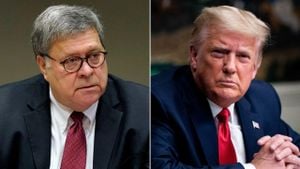Elon Musk and Vivek Ramaswamy are shaking things up with their latest ambitious plan dubbed the Department of Government Efficiency (DOGE). Recently unveiled by the duo, this initiative aspires to trim down the federal workforce significantly by identifying "thousands" of regulations for elimination. Ramaswamy, also the presidential hopeful, and Musk, the tech billionaire, aim to justify what they anticipate will be widespread layoffs across the government.
According to their recent op-ed published in the Wall Street Journal, DOGE is framed as part of their effort to streamline government operations, echoing previous calls for efficiency discussed by former President Donald Trump. The duo claims this approach will not only reduce bureaucratic red tape but also lead to substantial reductions in government personnel.
Details about DOGE might draw skepticism from critics due to the duo's controversial histories and Musk's penchant for dramatic claims. For those unfamiliar, Ramaswamy has made headlines for his strong rhetoric on several political issues, pushing the Republican narrative excitingly forward. Meanwhile, Musk's ambitious ventures range from electric vehicles with Tesla to space exploration with SpaceX. Both figures are no strangers to making bold promises.
Despite the grand intentions behind the establishment of DOGE, concerns arise about how this plan would actually operate. Particularly troubling is the notion of laying off thousands of federal employees, particularly when considering the intricacies of governmental operations and public service needs. Critics have raised eyebrows about how effective such cuts could be without harming the general public, especially those who rely on government services.
Another key aspect of DOGE is the focus on reducing regulations, which Musk and Ramaswamy believe stifles business and innovation. They argue simplifying the regulatory environment can invigorate economic growth, citing their experiences as entrepreneurs. Critics argue, though, managing this complexity could lead to oversights affecting environmental protections, workers' rights, and public health.
Both Musk and Ramaswamy stepped up following Trump's election campaign announcement, positioning themselves as key players who can influence the Republican agenda markedly. Ramaswamy, particularly, aims to leverage this partnership to catapult his political prospects, directly associational with the sheer influence Musk wields over technology and finance.
Interestingly, rather than creating a traditional government department, DOGE is being promoted as more of an advisory body working alongside the White House, raising questions potentially about its legitimacy and effectiveness. Fareed Zakaria, writing for the Washington Post, noted how this could create ambiguity over the panel's actual capabilities, and whether it would have real authority to enforce changes.
Meanwhile, the establishment of DOGE is seemingly provocative and aligns itself with broader criticisms against governmental bureaucracy. Ramaswamy and Musk's move highlights their contempt for the status quo, advocating for radical transformations to meet their vision of efficiency.
Interestingly, this isn't the first time conceptions of government efficiency have surfaced across political dialogues. The idea has long floated among various political factions, with advocates pushing for reform to achieve budgetary savings and improved service delivery. Yet, achieving such lofty goals without disrupting necessary services remains a considerable challenge.
While Musk and Ramaswamy's ambitions for DOGE demonstrate enthusiasm toward tackling Washington's inefficiencies, realigning federal functions and employee compensation could stir significant pushback from labor unions and civil rights organizations concerned about the punitive impacts of mass layoffs.
Broader public opinion remains to be seen, but initial reactions showcase fragmented sentiment—ranging from intrigue about the potential for innovation to outright concern over who would suffer most from proposed eliminations of jobs.
Looking forward, it will be imperative for the GOP to explain how they would safeguard public interests amid ambitious plans for reform. If these plans gain traction and evolve past the rhetorical phase, the effects on the federal workforce and the broader economy could shape the upcoming election and set significant policy precedents moving forward.



